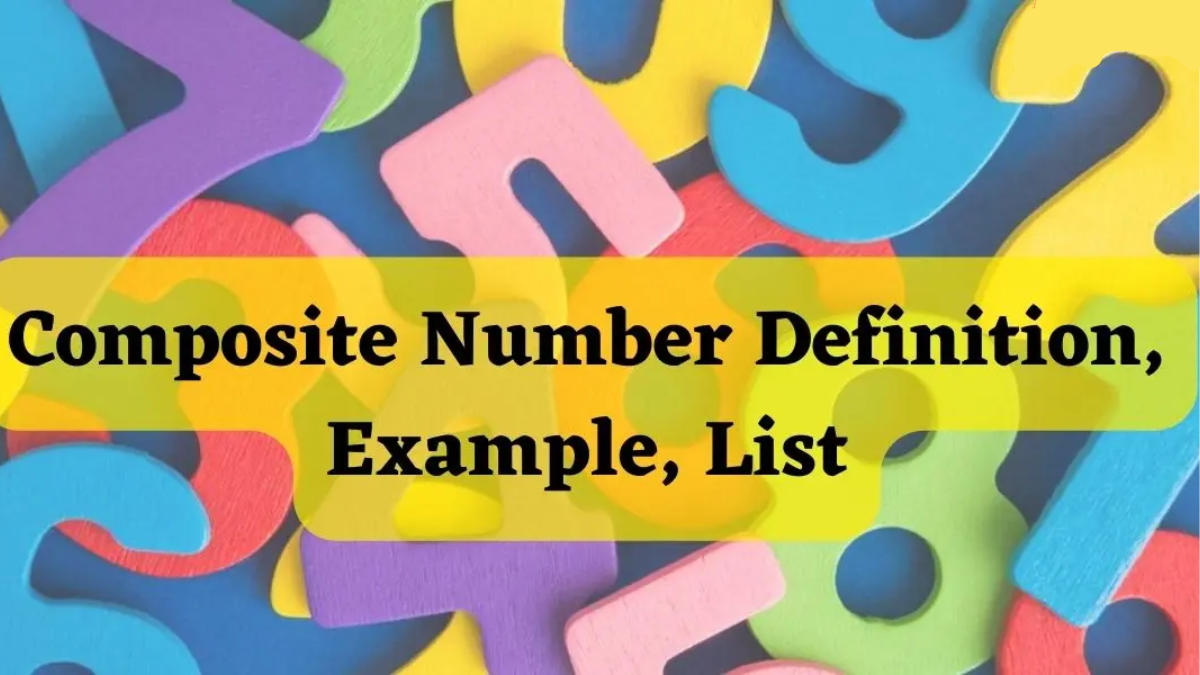Table of Contents
In mathematics, Depending on how many factors they have, Natural Numbers can be categorized into two classes. Composite numbers and Prime Numbers. Composite numbers are those with more than two elements and exactly the opposite of prime numbers, which have only two factors: 1 and the number itself. All natural numbers other than prime numbers are composite numbers since they can be split by more than two numbers.
Composite Number Definition
Composite numbers have a large number of divisors, as opposed to prime numbers, which have just two factors. The factors of these numbers are also known as composites. Since they can be split by more than two integers, any natural numbers that are not prime numbers are composite numbers.
A number is a prime number if it only has two factors: one and the number itself. The opposite of prime numbers is composite numbers.
In this article, we will learn about the meaning of composite numbers, their properties, the smallest composite number, types of composite numbers, a list of composite numbers, and many more
What is Composite Numbers?
Natural numbers with more than two factors are known as composite numbers. A composite number is a number that can be divided by a number other than 1 and the number itself. Composites are another name for these numbers. The opposite of prime numbers, which have just two factors, are composite numbers. Among the first five composite numbers are 4, 6, 8, 9, and 10.
Composite Number Examples
Earlier we came to know that composite Numbers have more than 2 factors other than 1 and the number itself. Let’s take as an example of composite number 12. The factor of 12 is 1,2,3,4,6.12. So, as 12 has more than 2 factors, so we can say 12 is a composite number. Several examples of composite numbers include 6, 14,15,18, 25, 30, 40, and 52.
| Composite numbers | Factors |
| 6 | 1, 2, 3, 6 |
| 14 | 1, 2, 7, 14 |
| 15 | 1.3.5.15 |
| 18 | 1.2,3,6,9,18 |
| 25 | 1, 5, 25 |
| 30 | 1, 2, 3, 5, 6, 10, 15, 30 |
| 40 | 1,2,4,5,8,10,20,40 |
| 52 | 1, 2, 4, 13, 26, 52 |
Properties of Composite Number
The properties of such types of numbers are pointed out below
- All composite numbers can be divided evenly into smaller numbers, either prime or composite.
- Except for the Prime numbers, the rest of the Natural Numbers are Composite Numbers.
- There are more than two factors in composite numbers.
- Composite numbers can be divided equally by their factors,
- Every composite number has itself as a factor.
- The smallest composite number is 4
- 1 (One ) and 0 (Zero) are not composite Numbers as they have only one factor.
How to Find Composite Numbers?
Finding the given number’s factors enables us to find a composite number. A number is considered composite if it consists of more than two elements. The divisibility test is one of the most effective methods for determining a composite number. In order to examine whether a number is a composite number or a prime number, find every possible positive factor of the given number. The steps you can take to find composite numbers are listed below.
- To start, identify every positive integer’s factors.
- Consider a number to be a prime number if it only has the number itself and one other Factor.
- Consider a number to be a composite Number if it consists of more than two factors.
Let’s determine whether the number 18 is a prime or composite number. Let us find the factors of 18.
- 21÷1 = 21
- 21÷3 = 7
- 21÷7= 3
- 21÷21 = 1
Hence. The factors of 21 are 1,3,7, and 21. The number 21 fulfills the condition of being a composite number as it has more than two factors. So we can say that 21 is a composite number.
Composite Numbers 1 to 100
Between the composite numbers 1 to 100, there are 74 numbers. The following is a list of all composite numbers from 1 to 100.Composite numbers are positive integers greater than 1 that have at least one positive divisor other than 1 and themselves. Here is a list of composite numbers from 1 to 100:
| 4, 6, 8, 9, 10, 12, 14, 15, 16, 18, 20, 21, 22, 24, 25, 26, 27, 28, 30, 32, 33, 34, 35, 36, 38, 39, 40, 42, 44, 45, 46, 48, 49, 50, 51, 52, 54, 55, 56, 57, 58, 60, 62, 63, 64, 65, 66, 68, 69, 70, 72, 74, 75, 76, 77, 78, 80, 81, 82, 84, 85, 86, 87, 88, 90, 91, 92, 93, 94, 95, 96, 98, 99, 100. |
These are the composite numbers between 1 and 100. Remember that prime numbers are positive integers greater than 1 that have exactly two distinct positive divisors: 1 and themselves. So, numbers like 2, 3, 5, 7, 11, 13, 17, etc., are prime and not included in this list.
Types of Composite Numbers
In mathematics, there are primarily two categories of composite numbers:
- Composite Odd Numbers
- Composite Even Numbers
Composite Odd Numbers
The term “odd composite numbers” refers to all odd numbers that are not prime. For instance, the composite numbers 9, 15, 21, 25, 27, and 35 are odd. Because they have more than two contributing components and satisfy the criteria for composite numbers,
Composite Even Numbers
Even composite numbers consist of all the even integers that are not prime. Even composite numbers include 4, 6, 8, 10, 12, 14, and so on. They even composite numbers in this instance, because they have more than two contributing components and satisfy the composite number requirement.
Difference Between Prime and Composite Numbers
There are two classes of natural numbers. Numbers that are both prime and composite Below is a list of how prime numbers and composite numbers differ in mathematics:
| Point of Differnence | Prime Numbers | Composite numbers |
| Number of Factors | There are only two \factors because it can only be divided by one and by itself. | A composite number has included more than two factors (1 and itself). |
| Form | The only way to write it is as the product of two numbers. | The product of more than two numbers is one way to represent composite numbers. |
| Examples | 7 as 7 has only two factors 1 and 7. | 18. The factors of 18 are 1,2,3,6, and 18. |
What is the smallest Composite Number?
The smallest composite number is 4. A number that has factors besides 1, and the number itself is referred to as a composite number. Since 1 has only one other divisor, it is not a composite number. The number 2,3 are also not composite numbers as they have only two factors- 1 and the number itself . However, The divisors of the number 4 are 1, 2, and 4. Therefore, 4 meets the requirements for a composite number. 4 is the smallest composite number as a result.
You should also be aware that the smallest prime number is 2. The least odd composite number is 9, and 12 is the smallest two-digit composite number.
Composite Numbers One to 2 Hundred List
Composite numbers are positive integers with at least two components. We give a list of composite numbers ranging from 1 to 200. See the list of composite numbers ranging from 1 to 200. below.
4, 6, 8, 9, 10, 12, 14, 15, 16, 18, 20, 21, 22, 24, 25, 26, 27, 28, 30, 32, 33, 34, 35, 36, 38, 39, 40, 42, 44, 45, 46, 48, 49, 50, 51, 52, 54, 55, 56, 57, 58, 60, 62, 63, 64, 65, 66, 68, 69, 70, 72, 74, 75, 76, 77, 78, 80, 81, 82, 84, 85, 86, 87, 88, 90, 91, 92, 93, 94, 95, 96, 98, 99, 100, 102, 104, 105, 106, 108, 110, 111, 112, 114, 115, 116, 117, 118, 119, 120, 121, 122, 123, 124, 125, 126, 128, 129, 130, 132, 133, 134, 135, 136, 138, 140, 141, 142, 143, 144, 145, 146, 147, 148, 150, 152, 154, 155, 156, 157, 158, 159, 160, 162, 164, 165, 166, 168, 170, 172, 174, 175, 176, 177, 178, 180, 182, 184, 185, 186, 187, 188, 189, 190, 192, 194, 195, 196, and 198.
| Related Posts | |
| Pythagoras theorem | 1 to 30 Squares & Cubes |
| What are Integers in Maths | Natural Numbers |
| Profit and Loss Formula and Tricks | Volume of Cuboid |


 OAVS Question Paper 2025, Check OAV Expe...
OAVS Question Paper 2025, Check OAV Expe...
 GPAT Exam Date 2025, Registration Starti...
GPAT Exam Date 2025, Registration Starti...
 Navodaya Vidyalaya Previous Question Pap...
Navodaya Vidyalaya Previous Question Pap...






























